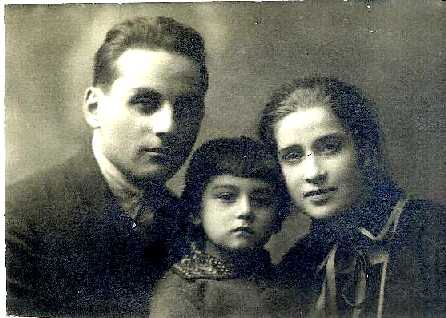David Levin together with his father and mother
This photo was taken in Leningrad in 1929, just after we moved from Vitebsk. Here you can see me, David Levin, together with father Zakhar Lervin and mother Slava Levina (nee Meerson).
In 1928 father moved from Vitebsk to Leningrad, and in half a year we, I and my mother, followed him. Since that time I consider Leningrad my native city. We lived on the Gogol (today Malaya Morskaya) street. In that shared apartment, in one room, we lived for almost all our life.
In Leningrad we lived very poor. My parents worked very much, especially mother. She was a cashier in Leningrad House of Selling for a long while, and also she's been working for Torgsin 10. Those Torgsin stores were organized in middle 1920s when the Soviet authorities decided to take out gold, silver and jewelry, but legally, not due to repressions, so people came and got food instead of their gold. Mother worked there, and that was a great support. In those times it was nothing to eat, there was a few of food in whole country. There were no rich people, and if somebody war richer than others, he hide his treasures. And in Torgsin they gave ratios, and that was a big business. The ratio included the piece of sausage, the piece of cheese, some butter, and some sugar. That was a holiday to get a ratio. I know all that because I helped my mother to carry the packages. All Torgsin employees got ratios in the boxes. That was such help! Later mother worked in the famous shoe store on Nevsky Avenue, 11, between streets of Gogol and Gertzen. And in front of it there was a 'Death to husbands' - the stockinet store [famous city shop].
Parents had good relations. Probably, there were some scandals, but they lived friendly, and they lived together for almost fifty years.
My mother's and father's mother tongue was Yiddish. But mainly they spoke Russian to each other. To tell the truth, if they and their relatives didn't want us, the children, to understand what they were talking about, they spoke Yiddish. Like that: they spoke Russian, then suddenly put some Yiddish words, and that meant that they said something, forbidden for little children. And they talked to mother's brothers and sisters both Russian and Yiddish.
Mother was very relative person; her origins come from the very friendly family. And later, when I met father's relatives too, they seemed to be very nice, very kind, very honest people. I can prove that for sure. Father was a friend not only of mother's relatives. Sometimes he was tired of them; he said that he was full of them. But as a matter of fact he was very company person.
In our shared apartment Fedosia Yacovlevna (she was Jewish either), who, as a matter of fact, actually grew me up, lived in one of the rooms. Her daughter Olga Markovna, music teacher and husband of her Anatoly Yacovlevitch Vol, an artist, lived in another room, they had no children, and the neighbor liked me very much, I was instead of her grandchild. She studied with me a lot, brought tasty things, and when summer period had begun, she came to my parents and said: 'When we are going to leave for dacha?' and many years ahead we went to Sestrorezk [town near Leningrad, the spa place]. So neighbor did more for my education than my mother, who was always busy.
Another neighbor was Elizabeth Vladimirovna; I remember that she had an angry dachshund. Later she's got married and moved from our apartment, it happened before the World War II. We had good relations with our neighbors. Everything was all right.
Sometimes parents went for holidays. Father, I know, had been to Berdyansk [port town on the bank of Azov Sea], to my opinion, that happened in 1939; they gave him a voucher on the factory (Stalin factory was quite a rich one). Mainly, the parents went for holidays separately, I think. Mother relaxed together with her sisters. And when I've been to dacha, father came every week to see me and Fedosya Yacovlevna. I went to the station, met him, he always brought some food. However, I guess that they didn't have plenty of vacations or holidays.
